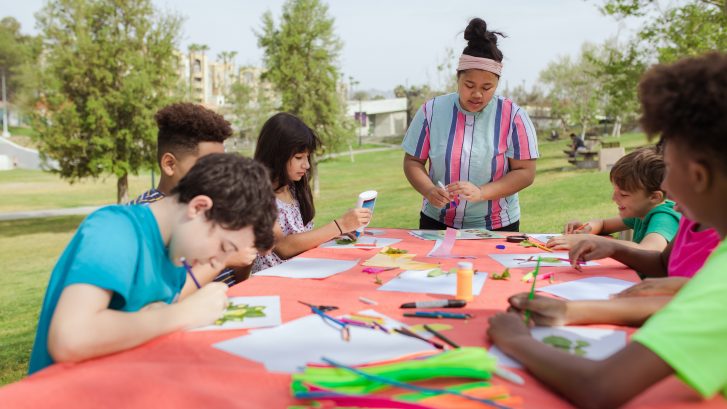Kids, Summer Camp, and COVID-19
The guidance surrounding the best ways to protect children from the coronavirus continues to rapidly change and become increasingly complex. One especially perplexing area of contention arose in recent weeks regarding COVID-19 and kids summer camp. Our primary care concierge doctors in Jupiter hope we can help clear up some of the confusion for you.
The Centers for Disease Control and Prevention (CDC) announced in April it recommended staffers and campers wear masks at all times. This recommendation stemmed from the coronavirus vaccine still not being available for adolescents under age 16.
Then a few weeks ago, the CDC released new guidance. It said face coverings are rarely necessary when outdoors, and vaccinated people had no need to wear masks at all. In addition, in the intervening weeks, the Pfizer-BioNTech vaccine was approved for children 12 and up. Since then, more than six million young people between the ages of 12-17 received vaccinations.
This raised questions about its earlier summer camp-related COVID recommendations. If the older children and camp staffers were vaccinated, and most of the activities took place outdoors, why would kids in camp need to stay masked at all times?
Many states refused to go along with the CDC’s April guidance, and parents and camp organizers also balked.
Changing guidance
The conflicting messaging prompted the CDC late last month to revisit its initial recommendations. Late last month it released newer, less-restrictive guidelines. It still stressed, however, local rules and regulations should prevail over CDC guidance.
For both overnight and day camps whose attendees and staff are fully vaccinated against COVID-19:
- Camps can reopen safely without capacity limits, masking, or social distancing.
- They do not need to maintain routine surveillance testing.
- They do not need to quarantine individuals not experiencing COVID-19 symptoms who are exposed to someone with a suspected or confirmed case of the virus.
For those with a mix of vaccinated and unvaccinated staff and attendees:
- Unvaccinated people over the age of two are advised to wear masks indoors and in crowded outdoor settings.
- Unvaccinated people should avoid playing in close-contact. This includes indoor sports, group gatherings, events, and meetings where physical distancing can’t be maintained.
- Staff and campers should be separated into smaller “cohorts” or groups. These groups should remain together the entire day and as much as possible during the duration of the camp.
- Within a cohort, maintain physical distancing of at least three feet.
- Maintain a physical distance of at least six feet outside the cohort. Also maintain distance when kids are eating or drinking outside without masks, even among their cohort.
- If a camp does experience an outbreak of COVID-19, individuals who test positive for the coronavirus should be isolated. Unvaccinated contacts of that person should be quarantined.
“Maybe you have a bunch of kids together and you’re shouting out camp cheers or singing songs,” CDR Erin Sauber-Schatz, leader of the CDC’s Community Interventions and Critical Populations Task Force, told NPR. “We know that COVID-19 has spread in scenarios where the respiratory droplets can go further, which is anytime you raise your voice. So in those higher risk situations, even outdoors, it makes sense to wear a mask.”
Other recommendations
The CDC also stressed camps should be supportive of staff or campers who choose to wear masks. It also urged all attendees—staff and campers—to be fully vaccinated before attending camp. “Fully vaccinated” means: having both doses of the Pfizer or Moderna vaccines or the single dose of the Johnson & Johnson vaccine, and waiting two weeks for full immunity to take effect.
In addition, the agency advised camps should continue to follow cleaning, disinfecting, and ventilation recommendations, including routine cleaning of high-touch surfaces and shared objects. They should also maintain improved ventilation, including opening windows, using air filters, and turning on child-safe fans.
“Camp activities should occur outside as much as possible,” the CDC advises. “If activities are held indoors, bring as much fresh air into camp buildings as possible to help keep virus particles from concentrating inside.”
Keeping it simple
NPR reported that because it could be too complicated to run a mixed camp of vaccinated and unvaccinated participants, some camps may choose to go with a policy that requires masks for everyone.
Sara Bode, a pediatrician at Nationwide Children’s Hospital in Columbus, Ohio, who serves on the Council on School Health for the American Academy of Pediatricians (AAP), told NPR that “most camps I’ve talked to, even if they have some vaccinated [campers], even if their staffs are fully vaccinated, will be requiring masks for everyone.”
The confusion with COVID-19 recommendations for children’s summer camp stems from the CDC’s desire to err on the side of caution.
Even with all the recommended restrictions, however, the agency stresses that “[y]outh camps can play an important role in the lives of children, including supporting their social, emotional, and physical development [and] provide opportunities for children to try new activities, develop relationships, develop social and emotional skills, and be physically active.”

